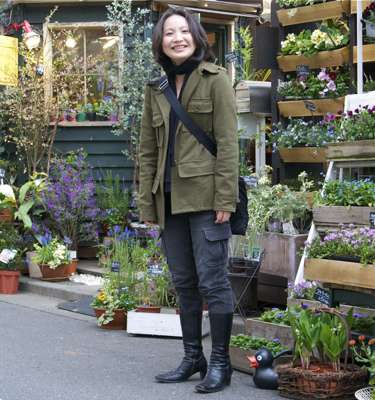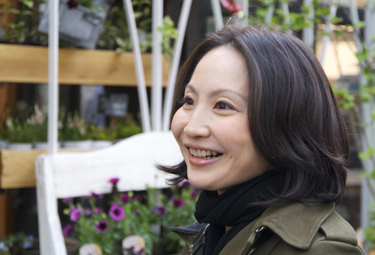
Posted: Mon Apr 12 2010
Ito Shoji, acupuncturist
Do you like flowers?
IS: I love flowers. I always make sure to keep a lot of plants around where I work.
And what is it that you do?
IS: I’m an acupuncturist. My clinic is just around the corner.
An acupuncturist? You don’t quite look like what I’d expect…
IS: [Laughs] When you hear the word ‘acupuncturist’ you imagine someone a little more no-nonsense and subdued. Definitely. But I worked in an office before becoming an acupuncturist, so I guess I’m a little different to someone who’s always dreamed of being one.
Where do you buy your clothes?
IS: There’s this select shop in Jiyugaoka. Or I often go to shops like Zara.
By the way, how does one go about becoming an acupuncturist?
IS: Three years of studying at a vocational school and you should have all the national requirements down. Then you need to take the national licensing exam. When you pass that, congratulations, you’re an acupuncturist! Actually, even though I say ‘acupuncturist’, you really need two licenses, one to practice acupuncture, and one to practice moxibustion.
What made you decide to become an acupuncturist?
IS: I’ve had these headaches ever since I was a little kid, so I’d been seeing an acupuncturist for a while. Also, I’ve always been a granny’s girl; I love my grandmother. I learned the importance of touching through taking care of my grandmother. You know you can heal your body just through touching. I decided to become an acupuncturist to ensure that my grandmother and I have as much time together as possible.
With Western medicine you can’t prescribe a course of action until after you’ve diagnosed the cause of the problem. When someone has a fever, you give them medicine for a fever. When someone has a headache, you give them a painkiller. But Eastern medicine has a more integrated approach to healing. You pay attention to both the patient’s body and soul. This can work even when you don’t know the direct cause of the problem. What’s most fascinating about Eastern medicine is how it strengthens the patient’s natural healing powers.
I’m guessing that you meet all types of people here in Tokyo. Have you noticed any common trends?
IS: Everyone’s like, ‘I am so busy, but my body just isn’t pulling its weight. I’m in big trouble if my body doesn’t get its act together right here and right now!’ So I would say that there are a lot of people who are angry with their own bodies. Originally I worked in the financial sector. I’d have to wake up bright and early and stay up until God knows when in order to accommodate for the differences in time between Japan and the foreign countries my company dealt with. It was an incredibly difficult schedule. And so I totally understand the need to push one’s body further and further. You can keep on going even when you’re caught up in a whirlpool, but if you haven’t got your feet on solid ground you’re just going to keep getting more and more exhausted.
Is there a simple way to deal with exhaustion?
IS: Your body will rejoice at the littlest of things. For example, saying ‘thank you’ to your body when it comes through for you. Just by saying ‘thanks for today’ while soaking in a nice tub – and it needs to be a bathtub, not a shower – can make a world of difference. This’ll improve the quality of your sleep, no matter how little sleep you are getting. And I even think you’ll be able to better appreciate just how delicious food can be. You only have one body. You need to take care of your body because you and your body are going to be with each other for a long time. Be good to yourself. Saying ‘I love me, me, me’ might be nothing more than selfishness, but saying ‘I love me’ is really important.
Lately, my face has been a little droopy. Is there any pressure point that I can use to tighten things up a little?
IS: [Laughs] Try loosening things up a bit by rubbing about a fist’s length above your ears when you’re shampooing. This will relax the muscles of your face and give your face a nice, soft focus look. Other than that, try not to let your neck, wrists, ankles, and other joints get too cold. This is especially important of the neck. Everyone needs to wrap themselves up nice and warm.
Are there any sweet shops around Toritsu-daigaku that you would recommend for people who think that sweets are the path to a stress-free life?
IS: There’s Terrace Café 720. It’s part café, part flower shop and part general store. It has this wonderfully liberating feel to it. It’s really quite lovely. There’s also Chimoto – I love giving their ‘Yakumo-Mochi’ [a Japanese rice cake sweet made with cashews, egg whites, brown sugar and gelatin] as gifts. It has a flavour that you can’t quite find at other Japanese sweet shops.
More from Ito:

‘There’s this herb called burnet that’s my absolute favourite. And it’s so beautiful when a rose’s petals have begun gently to open.’
‘I get some foreign patients at the clinic. There’s even this one guy who can assess the state of his body by measuring his pulse. There are so many people who inspire me to study more.’
‘For me, it’s not about building a lot of clinics. I’ll be happy if I can help a lot of people to find the time to unwind and enjoy their day.’
Ito Shinkyu Chiryoin (Full details & map)
Tags:
Tweets
- About Us |
- Work for Time Out |
- Send us info |
- Advertising |
- Mobile edition |
- Terms & Conditions |
- Privacy policy |
- Contact Us
Copyright © 2014 Time Out Tokyo














Add your comment